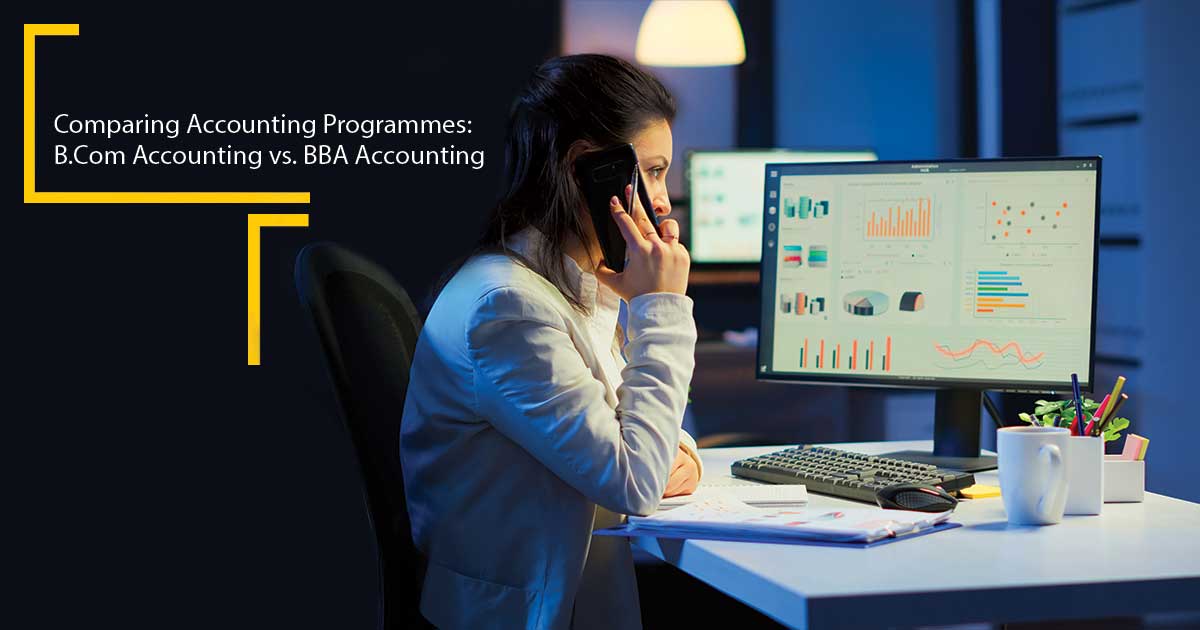Blog Detail


Comparing Accounting Programmes: B.Com Accounting vs. BBA Accounting
26-02-2024

Choosing the right educational path is crucial and can significantly impact one's career trajectory. Accounting and business administration are dynamic and essential components of the global economy. Aspiring individuals often find themselves at a crossroads when choosing between a Bachelor of Commerce (B.Com) in Accounting and a Bachelor of Business Administration (BBA) in Accounting. Both programmes offer a solid foundation in accounting principles but differ in various aspects, including curriculum, focus, and potential career prospects.
B.Com Accounting programmes are known for offering a comprehensive and wide-ranging perspective on the corporate world. Accounting is still the major focus, but students also learn about other aspects of business, which helps them understand how different business disciplines are related to each other. This wider viewpoint might be helpful for anyone seeking a versatile skill set.
BBA Accounting programmes are designed to offer a solid foundation in business administration with a focus on accounting. In addition to learning the nuances of accounting standards and procedures, students also acquire knowledge of corporate strategy, decision-making procedures, and leadership abilities. This focused strategy may be especially appealing to those aspiring to take on managerial positions in the future.
Course duration
B.Com Accounting programmes typically have a duration of three years for full-time students. The standard three-year format allows students to delve into the core concepts of accounting, finance, and related subjects, ensuring a comprehensive understanding of the field. The curriculum is structured to cover foundational courses in accounting, economics, business law, and other relevant areas. This relatively shorter duration appeals to individuals who seek a more streamlined and specialised education in accounting without the broader business context.
BBA Accounting programmes generally have a similar duration, spanning three years for full-time students. The timeframe results from the programme's comprehensive approach, integrating accounting studies within a broader business curriculum. BBA students cover a wide range of business subjects, including marketing, management, entrepreneurship, and human resources, in addition to their accounting coursework. This allows for a more in-depth exploration of the interdisciplinary aspects of business, providing students with a holistic understanding of how accounting functions within the larger organisational context.
Curriculum
B.Com Accounting is a traditional and widely recognised programme that primarily focuses on a broad range of business-related subjects including accounting, finance, economics, and business fundamentals. The coursework in B.Com Accounting programmes often emphasises theoretical concepts and practical applications, giving students a comprehensive understanding of accounting principles and their real-world implications. The curriculum emphasises a comprehensive understanding of accounting principles and typically includes courses in:
- Financial accounting
- Taxation
- Law
- Audit and assurance
- Business practices
- Economics
- Accounting Information Systems
- Marketing
- General management
The BBA Accounting programme is designed with a specific focus on the business aspects of accounting. BBA programmes often integrate real-world case studies and practical experiences to bridge the gap between theory and application. BBA Accounting programmes typically incorporate a combination of business and accounting courses, enabling students to develop not only strong accounting skills but also a broad understanding of how accounting functions within the larger business environment. The curriculum typically includes core financial and managerial accounting courses, such as:
- Principles of Management
- Financial Accounting
- Corporate Finance
- Taxation
- Business ethics
- Marketing
- Organisational behaviour
- Entrepreneurship
- Strategic management
Career opportunities
Graduates with a B.Com in Accounting often find opportunities in traditional accounting roles such as auditors, tax consultants, or financial analysts. This programme is well-suited for individuals inclined towards a more traditional accounting career and who wish to build a solid foundation in accounting theory. The diverse curriculum equips them to explore roles beyond accounting, such as business management, finance, or even entrepreneurship, or even:
- Chartered Accountants (CA):Completing a B.Com in Accounting provides a solid foundation for pursuing a CA designation. CAs often work in audit firms, providing financial advice, and ensuring compliance with accounting standards.
- Tax consultants:B.Com graduates can specialise in tax consultancy, helping individuals and businesses navigate tax laws and optimise their tax positions.
- Financial analysts:B.Com graduates can analyse financial data and provide insights for decision-making in various industries.
- Auditors:B.Com graduates can ensure the accuracy of financial records and compliance with regulations.
- Financial planners:B.Com graduates can help individuals and businesses manage their finances, investments, and retirement planning.
- Treasury analysts:Managing financial assets and risks within an organisation's treasury department is a potential career path for B.Com graduates.
Graduates with a BBA in Accounting are well-positioned for roles that require a combination of accounting expertise and business acumen. They may find financial management, strategic planning, and executive leadership opportunities. BBA programmes often prepare students for a faster transition into managerial roles within the accounting profession. This interdisciplinary approach prepares students for roles that require a blend of accounting expertise and business acumen, such as:
- Accounting managers: BBA in Accounting graduates can take on roles as accounting managers, overseeing the financial operations of a business.
- Internal auditors:BBA in Accounting graduates can pursue careers as internal auditors, helping organisations identify and address potential risks, and ensuring that a company's internal controls and financial processes are effective and compliant.
- Management consultants:BBA in Accounting graduates can provide advice on improving organisational efficiency, cost management, and strategic planning.
- Entrepreneurship: BBA graduates can start their own businesses or provide consulting services to other entrepreneurs.
Both B.Com and BBA Accounting serve as stepping stones for further education. Graduates can pursue master’s degrees, such as Master of Commerce (M.Com) or Master of Business Administration (MBA), to enhance their expertise and open up more advanced career opportunities. The choice between the two ultimately depends on an individual's career goals, preferences, learning style, and desired skill set. Both B.Com Accounting and BBA Accounting pave the way for rewarding careers in the dynamic and ever-evolving field of accounting and business.